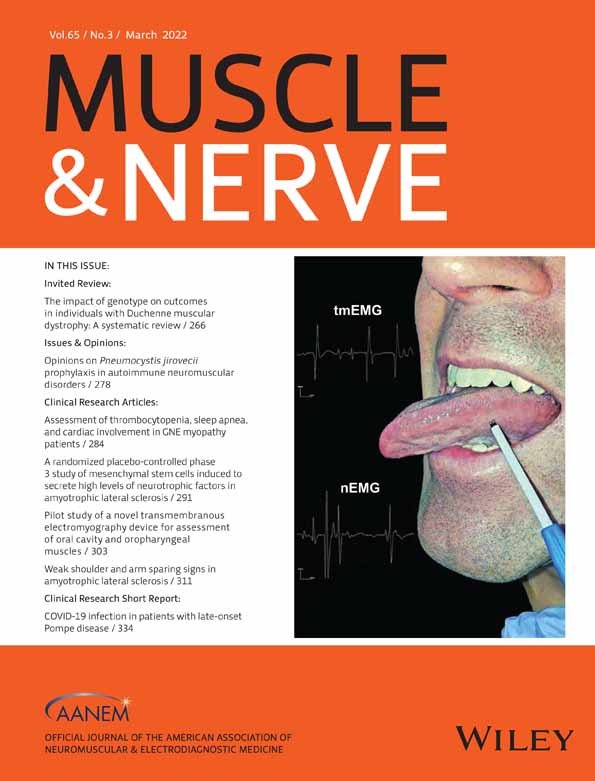COVID-19 infection in patients with late-onset Pompe disease
Abstract
Introduction/Aims
Severe acute respiratory syndrome coronavirus-2 2019 (SARS-CoV2/COVID-19) is frequently more severe in individuals with pre-existing respiratory and cardiovascular conditions. The impact on patients with neuromuscular disorders is of concern, but remains largely unknown. Late-onset Pompe disease (LOPD) is a lysosomal-storage disorder characterized by progressive skeletal and respiratory muscle degeneration. Mortality is typically caused by respiratory failure. We examined the impact of COVID-19 on these patients.
Methods
This is a case series of four patients with LOPD who contracted COVID-19.
Results
All patients had a mild/moderate illness from COVID-19 and did not require hospitalization. Neurological worsening occurred in one, with no change in physical ability in the other three, and respiratory symptoms remained stable in all four.
Discussion
COVID-19 infection can result in a benign course in some patients with LOPD. However, individuals with LOPD remain at high risk and should receive COVID-19 vaccinations and exercise precautions to avoid exposure to COVID-19 infection.
CONFLICT OF INTEREST
T.M. has served in an advisory capacity for AbbVie, Alexion, Amicus, Argenx, Audentes, Modis, Momenta, Ra Pharmaceuticals, Sanofi-Genzyme, Sarepta, Spark Therapeutics, UCB, and Ultragenyx. He serves on the speaker’s bureau for Sanofi-Genzyme and on the medical advisory boards for the Myositis Association, the Neuromuscular Disease Foundation, the Myasthenia Gravis Foundation of California, and the Myasthenia Gravis Foundation of America. He receives research funding from the Myositis Association; the Muscular Dystrophy Association; the National Institutes for Health (NIH); and from Alexion, Amicus, Argenx, Audentes, Bristol-Myers-Squibb, Cartesian Therapeutics, Grifols, Momenta, Ra Pharmaceuticals, Sanofi-Genzyme, Spark Therapeutics, UCB, and Valerion. He serves on the data safety monitoring board for Acceleron, Sarepta, and the NIH. The remaining authors declare no potential conflicts of interest.
Open Research
DATA AVAILABILITY STATEMENT
The data that support the findings of this study are available on request from the corresponding author. The data are not publicly available due to privacy or ethical restrictions.




